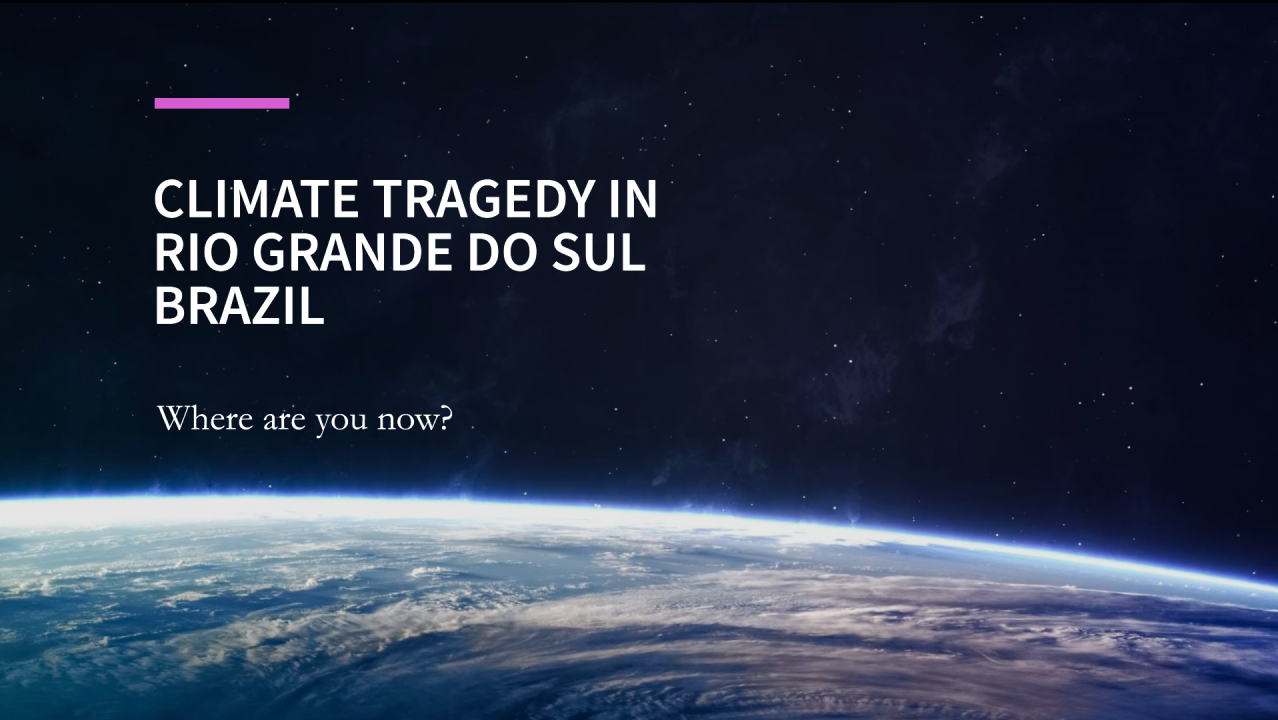
Coping with Climate Emergencies: A Call to Action for Leaders
Hildengard Ludwig Allgaier
CEO na Ehlo | MBA Nottingham University | Mentor & Strategic advisor
Reviewed by Kayla Svoboda and Fabiana Bernabe
When I first entered a classroom in Oxford, UK on a Wednesday morning at 9am, I was a 24-year-old suddenly faced with the reality of my pre-intermediate English language skills. Even the aging blue carpet seemed to reflect my state of despair. This was 2009.
Now, at 39, that same feeling of anxiety has resurfaced, but for a far graver reason. Over the past eight months, torrential rains and intense floods have devastated my home state of Rio Grande do Sul, Brazil. The floods have left 452 towns submerged, affecting more than 2 million people, including 149 fatalities, 76,580 people in shelters, and 538,126 people displaced as of 15 May (source: GOV RS). Warnings suggest this won't be the last time this region faces such devastation.
The climate emergency has halted many of my dreams, reminding me that the present moment is all we truly have.
Local aid infrastructures are frantically working, emergency hotlines are overwhelmed, and safe spaces are being created for children separated from their families. Amidst this chaos, peace and calm are desperately needed.
In discussions with mental health professionals, I've come to believe that normalizing conversations about preparing for climate emergencies and addressing their psychological impacts can benefit society as a whole.
For over 16 years, I have been involved in the sustainability movement. Yet, some responses to the questions I am asked no longer resonate with me.
I feel ambivalent about what “working in sustainable development” has become, and the recurring question I receive from people, “What is ESG?”, reflects society's unpreparedness for the gravity of the climate crisis.
As I write, the rain continues to batter my windows. My dog has been indoors for days, and my family is anxious. My father’s nervous ticks as he touches his face before sitting down to lunch reflect his discomfort with the home-feels-like-a-prison sensation caused by the floods.
Jem Bendell, an emeritus professor of sustainability leadership at the University of Cumbria in the UK, writes about "deep adaptation" for individuals and communities anticipating and coping with the consequences of ongoing climate change. He identifies 4 key considerations with respect to climate disasters and the state of current coping mechanisms:
Professor Bendell highlights the uncertainty of financial markets’ response to climate shocks and the potential impact of climate disasters on electronic credit and payment systems. Should we be ready for potential financial collapse? See this post “Is CSR dead? Is Shared Value enough?” for further reflections on the concept of shared value in organizations.
2. What do we need to let go to not make matters worse?
We must address the psychological challenge of supporting people in grief, despair, and confusion. How do we prepare the health system and train thousands of doctors, nurses, and volunteers for the mental health impacts of climate crises and climate anxiety?
Vivienne Ming, a theoretical neuroscientist and founder of Socos Labs, suggests that we become “problem explorers” as the complexity of environmental issues increases. This suggests an opportunity for more people to work directly on issues that create a real impact in terms of responding to the climate crisis. How can we ignite collective intelligence to support people in need?
3. We need to explore the restoration of attitudes and approaches to a more down-to-earth life.
Community level action and support can yield opportunities for designing new exchanges that take into consideration benefits that go beyond financial returns.?
Companies that have an embedded sense of community and purpose perform highly. See this article “How to bake-in purpose in your business” for tips from business leaders on how to build an internal ecosystem for cultural alignment, products, and solutions to solve new problems arising from climate change.?
4. Walking towards reconciliation
Without reconciling different views on social, religious, gender, and political issues, we will not make progress on climate collapse adaptation and therefore we risk tearing societies apart. The road ahead is fraught with challenges and requires intentional decision-making. The only way to escape economic, political, societal, and climate despair, is to practice and expand our capacity to love our fellow beings.
Call to Action
The current climate emergency in Rio Grande do Sul, Brazil highlights the complexity of such crises, which lack a clear owner, timeline, or agenda. Within days, we went from being one of Brazil’s more economically stable and prosperous states to having over 2 million people affected. This can happen to any community, as climate emergencies are expected to become more frequent and severe worldwide.
As leaders, how can we effectively address these issues?
领英推荐
Reflect on these three questions:
Strategic and compassionate leadership is crucial in the face of climate change. Leaders should integrate sustainability into their core strategies, invest in mental health support systems, and foster community resilience.
Together, we can build a future where we not only survive but also create new systems, build diverse communities, and thrive psychologically amidst the climate crisis.
_______________
Further actions you can take:
Engage in community-led movements for climate like Observatorio do Clima in Brazil or Extinction Rebellion in Europe.
One of the reasons, why I set up Ehlo was to create the right conditions for people to prosper and have careers that really matter.
Ehlo supports companies and leaders to better prepare for this uncertain future. You can have an executive 1-2-1 mentoring session with me, Hilden Allgaier, or Kayla Svoboda – by sending us a message or completing this form.
Hildengard Allgaier
Founder of Ehlo
https://linktr.ee/hildenall +55 54 992262708
Kayla Svoboda
Research - Innovation - Strategy Consultant
MPhil in Development Studies, University of Oxford
Follow Ehlo:
Instagram: https://www.instagram.com/ehloschool/
Linktree: https://linktr.ee/hildenall